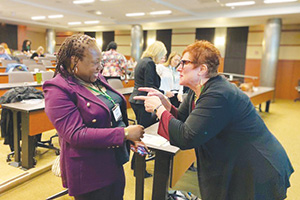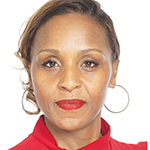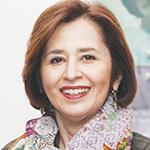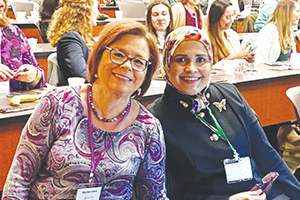By JULIE MINDA
When employees are more engaged in their workplace, they are more productive, deliver better outcomes and are more likely to stay with an organization.

Debra Rockey, right, Trinity Health senior consultant for human resources and organization effectiveness, chats with a participant at the Women's Empowerment Fall Event in October 2019, held at St. Mary Mercy Livonia Hospital in Livonia, Michigan.
One way that some Catholic health systems are deepening employees' engagement is by hosting affinity groups for employees who share common interests, and multiple ministry systems have established such groups for women. The groups aim to help women build connections with their colleagues, establish mentor relationships, advance their careers, build their skills and nurture their souls. Representatives from a sampling of systems say the groups' work has a direct impact on the mission.

Chastang
"When people are more engaged there is less turnover and greater employee satisfaction. We believe that this contributes to better care for patients and families," says LaRonda Chastang, Trinity Health vice president, diversity and inclusion.
Rapid growth
Mercy of Chesterfield, Missouri; Providence St. Joseph Health of Renton, Washington; and Trinity Health of Livonia, Michigan, are among Catholic health systems that host multiple affinity groups for their employees. Providence St Joseph Health has over 20 such groups, called "caregiver resource groups" including groups for Blacks, Latinos, veterans, and people who identify as LGBTQ. All caregiver resource groups are open to everyone. No one is excluded if they have interest in participating.

Canales
Debra Canales, Providence St. Joseph Health executive vice president and chief administrative officer, is the executive champion for the system's women's resource group. It was formed about three years ago by several women at the system's headquarters. It's grown to include 250 women and men; employees from multiple Providence St. Joseph Health facilities participate. Canales says the group provides "an opportunity to learn from one another and to learn more about the Providence family of organizations."

Maureen Heary, left, Trinity Health senior manager of enterprise infrastructure operations, and Shaista Ansari, Trinity Health applications technical analyst, participate in a fall 2019 Women's Empowerment Fall Event cosponsored by Trinity Health.
At Trinity Health affinity groups called "business resource groups" are led by employees and sponsored by executive leaders. Participation is open to any employee at any level. The groups are intended to "build an engaged system of colleagues throughout Trinity Health who are actively seeking personal and professional development," says Chastang. In 2018, Trinity Health had two business resource groups. Today, the system has more than 16.
The Women Inclusion Networks provide women with opportunities to pursue professional goals "that bring about fulfillment and allow women to give back to one another," Chastang says. There is a system-level women's group with about 80 participants and two smaller facility-level groups. Trinity Health also has a group in its mid-Atlantic market specifically for women of color. The health system is encouraging the creation of more local-level groups.
The Mercy Women in Leadership program launched in 2018. There are six committees. All together more than 700 people have signed on to participate. Employees at director level and above can join the Women in Leadership group.
Mercy encourages female physicians to take part in the affinity groups and about one in five are doing so. Mercy Vice President of Talent Experience Barb Grayson says participation can be beneficial for doctors considering a move into administration leadership.
Let's do lunch
The women's networking groups at Mercy, Providence St. Joseph Health and Trinity Health host educational series, lunch and learns, webinars and the like on such topics as resume building, career networking, goal setting, leadership skill-building, self-care and work-life balance.
Prior to the pandemic, Mercy and Providence St. Joseph Health each had in-person events that drew several hundred attendees. Trinity Health hosted "morning mingles" between resource group members and executives.
Under pandemic restrictions, group activities have migrated to virtual communications platforms including videoconferencing and social media. At Mercy, group members can join a Facebook site or a Microsoft Teams forum.
Executive rank gap
At Mercy, Providence St. Joseph Health and Trinity Health, one of the purposes of the women's groups is to encourage more women on career tracks that rise to executive roles, since women are not as well represented in executive suites as men are.
Chastang explained that "women are not always afforded opportunities for exposure to executive leaders and there is a lack of sponsorship and coaching for women to assume leadership roles."
The affinity groups may help women to overcome these barriers by giving them a forum to meet with, collaborate with and share ideas with one another and with Trinity Health leadership.
BUILD the BRG is a Trinity Health resource group that was formed for and by Black women. The acronym stands for Black women United In Leadership and Development the Business Resource Group.
Chastang says the group aims "to address the unique experiences of Black women in the workplace. Black women have different lived experiences, and experience the work environment differently based upon many factors including systemic racism and unconscious bias."

Bentzen-Mercer
Cynthia Bentzen-Mercer is executive vice president and chief administrative officer of Mercy and executive sponsor of Women in Leadership. She says that Mercy has less gender diversity at the senior leadership level than at lower levels. While the gap was not created intentionally, she says Mercy believes it must be intentional in addressing it, by creating new job pathways and opportunities for women.
Grayson says that by providing a structured way for women to connect with and mentor one another, and grow their skills, Mercy is encouraging women to aim high in the pursuit of career goals.
Chastang and Canales note the affinity groups also provide valuable visibility for women. Trinity Health taps its resource groups as focus groups for important system decisions. Providence St. Joseph participants in caregiver resource groups have visibility to executives.
Belonging
Bentzen-Mercer says the level of enthusiasm for Mercy Women in Leadership has been evident since the group's launch, when an email sent out to gauge interest garnered a rare 90 percent response rate. More than 80 percent of respondents expressed interest in serving on one of the six committees.
Chastang at Trinity Health says she finds it inspiring to see the involvement of extremely busy women who are working long hours during the pandemic. "In spite of competing demands, making time for BRG involvement is extremely rewarding and fulfilling" for Trinity Health employees.
Canales says while it is too early to gauge the impact of Providence's women's resource group, it is clear from anecdotal evidence that participants are benefiting.
She says, "One woman said to me, 'Now, after three years working here, I feel like part of a team.' We all want to have a sense of belonging. These groups create a sacred space, a place to have a conversation.
"It's the emotional elements that keep people here," Canales says.
Women at the top of Catholic health systems
As Catholic health systems and facilities aim to increase gender diversity in the executive suite, they have a solid foundation to work from. As organizations largely founded by and guided by women religious, many of today's systems have a long history of staffing top executive leadership roles with women.
Some examples include:
- Sandra Bruce was the first president and chief executive of Resurrection Health Care before it became Presence Health. Presence Health was acquired by Ascension.
- Patricia Cahill was the first president and chief executive of Catholic Health Initiatives, now a part of CommonSpirit Health.
- Elizabeth Dunne is president and chief executive of PeaceHealth of Vancouver, Washington.
- Sr. Therese Gottschalk, SSM, was president of Marian Health System from its founding until it joined Ascension.
- Lydia Jumonville is president and chief executive of SCL Health of Broomfield, Colorado.
- Laura Kaiser is president and chief executive of SSM Health of St. Louis.
- Diane Moeller was chief executive of Catholic Health Corp. of Omaha, which was a predecessor of Catholic Health Initiatives.
- Sr. Kathleen Popko, SP, was the president and chief executive of Sisters of Providence health system in Massachusetts.
- Deborah Proctor was the chief executive of St. Joseph Health System in California.
- Sr. Mary Roch Rocklage, RSM, was the first president and chief executive of Mercy Health System of Chesterfield, Missouri, which is now called Mercy.
- Sr. Mary Jean Ryan, FSM, was the first president and chief executive of SSM Health Care of St. Louis, which is now called SSM Health.
- Mary Starmann-Harrison is the president and chief executive of Hospital Sisters Health System of Springfield, Illinois.
- Sr. Jomary Trstensky, OSF, was the president of HSHS before Starmann-Harrison.
- Sr. Laura Wolf, OSF, was president and chief executive of Franciscan Sisters of Christian Charity Sponsored Ministries of Manitowoc, Wisconsin.
Women are underrepresented in c-suite, report advises America's health systems
A 2018 report from Korn Ferry says that while more than 75% of all hospital and doctors' office employees are women, there is far less representation of women in key leadership roles. Only 19% of hospitals are led by women. Only 4% of health system chief executives are women, according to the organizational consultancy.
"Women CEOs: The path forward for healthcare" says that in general companies with more gender diversity in executive administration have better financial performance than less diverse organizations; and those with more gender diversity in governance also have better operational performance, more innovation, less turnover and better employee engagement.
To increase gender diversity in their executive suites, the Korn Ferry report says, health care organizations should identify women early in their careers who have shown leadership potential and work with them to create a path to executive roles. The organizations should audit their promotion protocols to address barriers to women's ascent, the report's authors say.
The report recommends that organizations offer career coaching, mentorship and career sponsorship programs to connect women with colleagues who can help them succeed. It endorses the creation of groups where women can meet, encourage one another, collaborate and innovate. The authors recommend organizations conduct talent audits as part of their succession planning to ensure female candidates are considered for top positions.